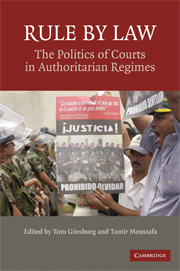Book contents
- Frontmatter
- Contents
- Contributors
- Introduction: The Functions of Courts in Authoritarian Politics
- 1 Of Judges and Generals: Security Courts under Authoritarian Regimes in Argentina, Brazil, and Chile
- 2 Administrative Law and the Judicial Control of Agents in Authoritarian Regimes
- 3 Singapore: The Exception That Proves Rules Matter
- 4 Agents of Anti-Politics: Courts in Pinochet's Chile
- 5 Law and Resistance in Authoritarian States: The Judicialization of Politics in Egypt
- 6 Courts Out of Context: Authoritarian Sources of Judicial Failure in Chile (1973–1990) and Argentina (1976–1983)
- 7 Enforcing the Autocratic Political Order and the Role of Courts: The Case of Mexico
- 8 The Institutional Diffusion of Courts in China: Evidence from Survey Data
- 9 Building Judicial Independence in Semi-Democracies: Uganda and Zimbabwe
- 10 Judicial Power in Authoritarian States: The Russian Experience
- 11 Courts in Semi-Democratic/Authoritarian Regimes: The Judicialization of Turkish (and Iranian) Politics
- 12 Judicial Systems and Economic Development
- 13 Courts in Authoritarian Regimes
- References
- Index
7 - Enforcing the Autocratic Political Order and the Role of Courts: The Case of Mexico
Published online by Cambridge University Press: 05 June 2012
- Frontmatter
- Contents
- Contributors
- Introduction: The Functions of Courts in Authoritarian Politics
- 1 Of Judges and Generals: Security Courts under Authoritarian Regimes in Argentina, Brazil, and Chile
- 2 Administrative Law and the Judicial Control of Agents in Authoritarian Regimes
- 3 Singapore: The Exception That Proves Rules Matter
- 4 Agents of Anti-Politics: Courts in Pinochet's Chile
- 5 Law and Resistance in Authoritarian States: The Judicialization of Politics in Egypt
- 6 Courts Out of Context: Authoritarian Sources of Judicial Failure in Chile (1973–1990) and Argentina (1976–1983)
- 7 Enforcing the Autocratic Political Order and the Role of Courts: The Case of Mexico
- 8 The Institutional Diffusion of Courts in China: Evidence from Survey Data
- 9 Building Judicial Independence in Semi-Democracies: Uganda and Zimbabwe
- 10 Judicial Power in Authoritarian States: The Russian Experience
- 11 Courts in Semi-Democratic/Authoritarian Regimes: The Judicialization of Turkish (and Iranian) Politics
- 12 Judicial Systems and Economic Development
- 13 Courts in Authoritarian Regimes
- References
- Index
Summary
INTRODUCTION
Autocrats have a hard time enforcing political order. They are unable to rely solely on coercion to enforce rules against their subordinates in the state apparatus, the citizenry, and powerful members of the ruling clique0. This chapter explores the various strategies the Mexican autocratic regime employed to enforce political order and how courts were transformed from weak to more powerful institutions.
In democratic political systems, courts are employed to arbitrate all sorts of conflicts, ranging from commercial disputes, labor disagreements, and criminal cases to major constitutional conflicts arising between citizens and the state and between different branches and levels of government. Autocrats employ courts to enforce their commands directed to bureaucratic subordinates and the citizenry, but they normally do not resort to these institutions to arbitrate conflicts among members of the ruling elite. These types of conflicts are more likely to erupt into violence. What alternative instruments do autocracies use to enforce political order and arbitrate conflicts among members of the ruling elite? When are autocracies likely to empower courts to settle political conflicts? What other roles do courts play in autocratic regimes? This chapter answers these questions in the context of Mexico.
The literature stresses that autocracies often turn to courts as mechanisms for inducing bureaucratic discipline within the administrative apparatus (Moustafa 2006; Shapiro 1981). Akin to “fire-alarm” oversight mechanisms (McCubbins and Schwartz 1984), this form of oversight is driven by the citizenry, who can generate an independent stream of information about bureaucratic abuses that other forms of vertical oversight cannot.
- Type
- Chapter
- Information
- Rule by LawThe Politics of Courts in Authoritarian Regimes, pp. 180 - 206Publisher: Cambridge University PressPrint publication year: 2008
- 20
- Cited by

